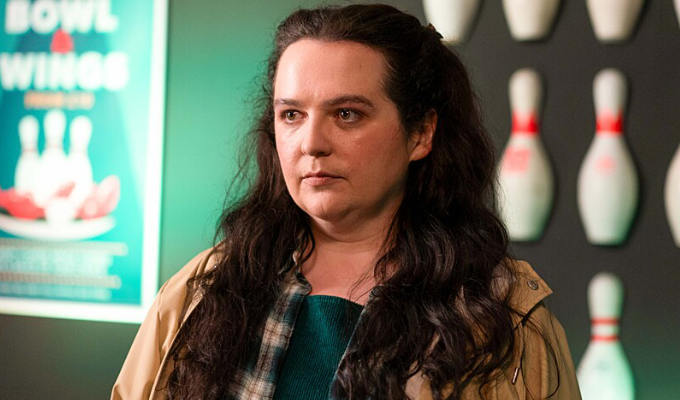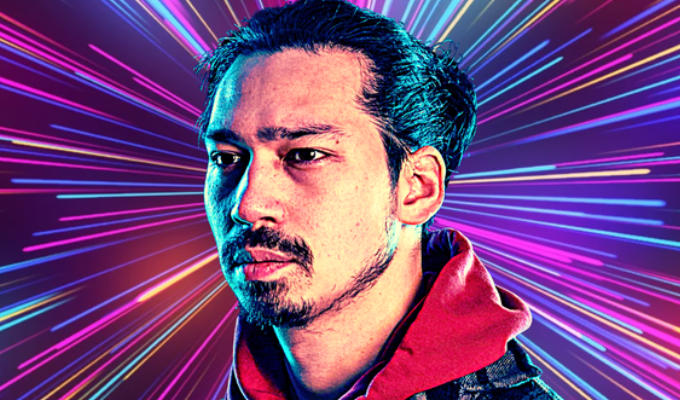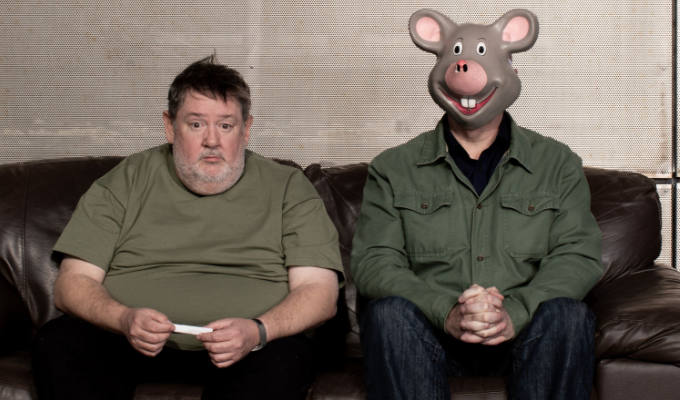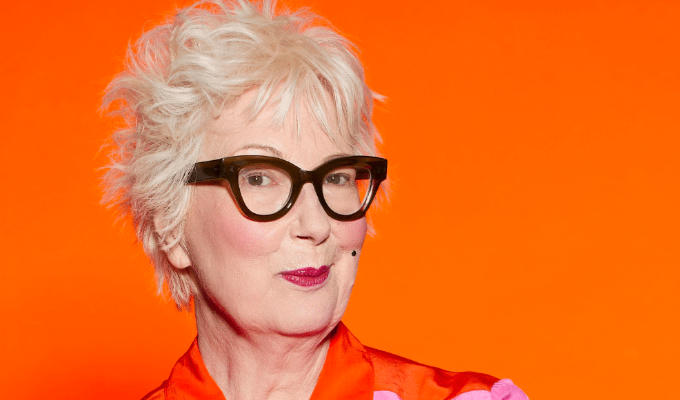 © BBC/Two Brothers Pictures
© BBC/Two Brothers Pictures 'I could be the female Seth Rogan'
Ashley Storrie on autism, the comedy star who stopped her being bullied and the Scottish sense of humour
Ashley Storrie stars in the new BBC comedy Dinosaur, which she also co-created with Matilda Curtis. Here she speaks about the show – which launches his weekend – and about her character Nina, an autistic woman in her 30s, whose world us upended when her beloved sister and best friend Evie announces she is is getting married.
What is Dinosaur about?
Dinosaur is about love, friendship, sisterhood and being your own self even if it makes people uncomfortable because, you should be comfortable.
Tell us how Dinosaur came to be?
[My audition was] during Covid, so I recorded it in my bedroom, by myself, I did all the voices! For a show called Dinosaur about a girl with autism - and I’m on the autism spectrum - that was really cool, as there’s not a lot of opportunities for that to be showcased or for me to be me, so I just auditioned for it, got the part and then they said ‘Would you like to help with the writing and the creating?’ And that’s amazing – so I said ‘Yes please!’ and now here we are.
We worked on the script mainly through Zoom because I was based in Glasgow and Matilda was based in London, and we just went through my life and experiences. We’ve taken from both of our experiences as young women, dating and just living our lives.
That’s how it came about with a lot of the stories. Matilda just came in one day and said that she got locked in a toilet so that’s in the script now
Do you think the Scottish humour in Dinosaur makes it unique?
People always say that Scottish humour is unique but it’s not. You know there’s that blood type that can be given to any donor? I think that’s Scottish humour. Because I’ve uploaded videos to the internet for years, of jokes, and I have people from all over the world who are like ‘That’s funny, I’m not from anywhere near where that comes from but… that’s funny.’
At Edinburgh Fringe there’s a group of Nigerian girls who come and see me every year because they say the stories about my mum
remind them of their mum. I think that’s what makes Scottish comedy great, it’s maybe you don’t fully understand every word that we’re saying but you get by the tone that we’re saying something funny.
What can you tell us about your character Nina?
Nina is a palaeontologist who loves her family. She loves her sister; she loves her city. She’s straightforward, she’s direct, and I think she’s sometimes more direct than me. I often feel a little bit envious of that because Nina lives out loud fully who she is and I sometimes still put on my mask to try and be something else, so I do find myself a little bit envious of her at times.
Tell us about Nina’s relationship with her sister Evie?
Nina and Evie are best friends, sisters, bonded through some sort of magical soul bond and they’re a bit co-dependent and overly reliant upon each other and maybe they’re trying to find out who they are without the other.

I think that can be true of sisters or best friends, the women you grow up with and latch on to shape you so much and when those friends move on, get married and have babies, sometimes you can often find yourself kind of freewheeling and left behind.
Who is your favourite character in Dinosaur?
Amber. She was also my favourite to write. When I wrote her, I always wrote her with long fingernails and when I spoke, I always had to do a lot of finger acting when I was trying to think what she would say. She is a wildcard; every sitcom has one.
If you look at Seinfeld, she’s the Kramer of the series. She’s an oddball that pops up at odd times and gets to say the wildest and best things.
What do you hope viewers will take away from the series?
It would mean so much to me if other people felt represented. When I do stand-up comedy, my first thought at the front of my head is that I’m going to say things that maybe other people haven’t said out loud before. Be it about mental health or physical health, how they feel about their families or grief.
These are all things that I’ve talked about loads and my main driving force every year at the Fringe was just to hope that somebody watching would go, ‘Oh I’m not alone’ or ‘I’m not weird, that’s a normal thing.’
So many things I grew up with, maybe because I was isolated or because I didn’t have a lot of friends, I thought it was just me and that’s the wonderful thing about art and television and poetry and books, it can make disenfranchised people feel part of something.
So that would be a big boon if one person watched it and said, ‘I’m a Nina’, that would be nice.
Do you think the show will resonate with viewers?
I think everyone can resonate with family, friendships, relationships and the bonds we forge to protect ourselves. I think a lot of people can relate to the idea of being comfortable and stepping out of that comfort. Even though it can sometimes be uncomfortable, in the end, it’s worth the while.
I also hope they relate to me because I look like me, I sound like me and I’m me – and I’m still on the telly. How wild is that? You’ve got all your weird looking-guys. Your Jonah Hills, your Seth Rogan’s. There’s not a female Seth Rogan! Now you’ve got a big-headed Ashley. You’re welcome.
Do you have a favourite scene?
There is a scene where Evie and I are coming back from a workout, it’s a very small scene, I’m giving her a piggyback and then we talk about Taylor Swift and then we chest bump and that’s my favourite.
You have a great cast. What has it been like to work with them?

Whenever you ask Sanjeev [Kohli, above] or Greg [Hemphill] or Sally [Howitt] to just adlib in the background, they will inevitably say something far funnier that I could have written, and I get so distracted by whatever nonsense they are talking that it is nigh impossible to continue what I’m doing, because I just want to listen to them.
They’re the greats of Scottish comedy acting. Sally has been in River City for 20 years playing Scarlett, she’s a comedy genius. She will run away if you leave her unattended, she does get easily distracted by bric-a-brac shops but she is one of the funniest people. [In River City], we don’t get to see the full range of Sally’s hilarity and I hope that this series, if nothing else, you get to see how funny that woman is.
When I was 17, Greg Hemphill came to my school and did a talk. He got to pick some kids from this audience of maybe 200 teenagers to read a little bit, and I didn’t have any friends. I was a loner, I was weird, and I really liked drama… I put up my hand and he said ‘you, what’s your name? and I said ‘Ashley Storrie’ and the rugby players behind me said ‘Ashley Storrie’ and all made fun of me.
I got up and it was an Isa line [from Still Game] and it weirdly had something to do with fish fingers and it’s so stuck in my brain. But I read this line in Isa’s old lady voice, I did the scene. And my whole class who had never even noticed me, all started laughing and then they all started cheering and it was the weirdest moment of my life.
It was so strange. Greg Hemphill turned to me in front of my whole class and said, ‘If you ever want a job when you leave school, you can come work with me’ and for three days I was popular, I was cool for three days because of that moment. Getting to kind of come full circle with that and work with him as a grown up is amazing.
How different has acting in a comedy been than stand-up?
True fact, stand-up comedy and acting are so different. There is the instant gratification of stand-up that you don’t get [in acting], and the first week I got very vexed when the crew weren’t laughing, and I didn’t understand that they weren’t allowed because that would ruin a take.
So, I would amp it up, make full eye contact with the boom operator like ‘Why are you not laughing at my jokes Charles? Laugh!’
Then I learned that’s not how you make telly and now I know.
What was it like filming in your hometown of Glasgow?
I was so excited., I think it’s one of the most beautiful places in the world and getting to showcase that and show it off was so exciting.
It was the biggest thing I was excited about. Never mind me being on telly, people are going to see Kelvin Way! We’re showing it in all its beauty
There’ll be nothing like this again, this is it for me and that’s fine. If this is the only thing I get to make, then I’m glad it’s this.
There is neurodiversity on and off the camera in this production. Why that was important?
I think having neurodiversity in any workplace is a good thing. We think differently, it’s just a different perspective, and different perspectives are always good because you can find the problems with things, or you can find different solutions because you’re looking at it from a different angle.
I think it’s also created a really good environment where people don’t feel uncomfortable to talk about these things. If someone is having a moment, be it me or anybody on the crew, there’s no shame in that, there’s no embarrassment.
First week I had my first wobble, I got really claustrophobic in a toilet, I got really frightened and I was so embarrassed, and I went outside. Three days later, I no longer felt the shame because nobody made me feel bad, nobody hurried me, nobody rushed me, nobody coddled me.
It was just a ‘No that’s fine, sometimes people feel like that and that’s allowed’ I think that’s a great thing. I don’t think that’s just neurodiversity, I think that’s just all of our brains need to be told
‘You’re allowed to feel that way’ and that’s been great for this production.
I’ve never made telly like this before. Up until this point, my experience of television is Factual Entertainment, which essentially means I get shoved in front of a crew with three people, one camera and a boom operator and I’m told ‘Go milk a cow’ and I do it and I say something funny while I’m doing it, and that’s it.
Niamh, the director, is so kind and so patient and if I don’t understand what’s she’s saying, she doesn’t get frustrated with me she tries to find a different way of explaining it and it’s so helpful. I think she fosters such a good environment on set.
Everybody was very kind but still managed to get the job done and I think she is proof that you don’t need to scream, and you don’t need to terrify people to get stuff done, you can do it with kindness, patience and compassion.
Three words to sum up Dinosaur?
Not about Dinosaurs.
• Dinosaur will air on BBC Scotland on Sunday and BBC Three next Thursday, April 18,. All episodes will be available on iPlayer.
Edited from an interview supplied by BBC Press.
Published: 9 Apr 2024






